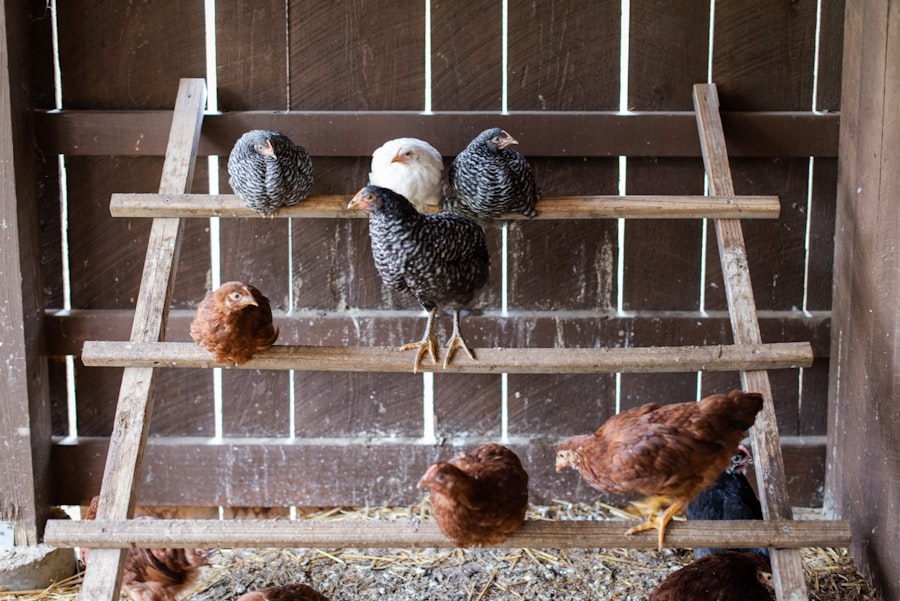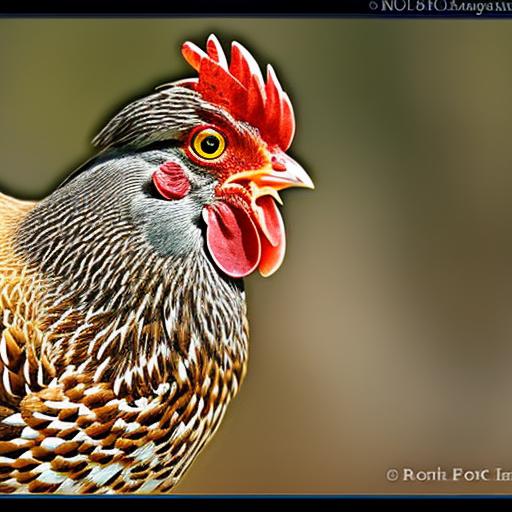Keeping chickens as a hobby has become increasingly popular in recent years. More and more people are discovering the joys of having these feathered friends in their backyard. Not only do chickens provide fresh eggs, but they also offer a unique and educational experience for both children and adults alike. Whether you live in a rural area or an urban setting, keeping chickens can be a rewarding and fulfilling hobby.
Key Takeaways
- Keeping chickens can be a rewarding experience for those interested in sustainable living and fresh eggs.
- Choosing the right chicken breed is important for egg production, temperament, and climate adaptability.
- Raising chickens can provide benefits such as pest control, fertilizer, and a sense of community.
- Essential items for a chicken coop include nesting boxes, roosting bars, and proper ventilation.
- Maintaining a clean and healthy chicken coop involves regular cleaning, pest control, and providing fresh water and food.
Choosing the Right Chicken Breed
When it comes to keeping chickens, choosing the right breed is essential. Different breeds have different characteristics and purposes, so it’s important to select one that suits your needs and preferences. Some popular breeds for backyard chicken keeping include the Rhode Island Red, the Plymouth Rock, and the Sussex. These breeds are known for their friendly temperament, good egg production, and ability to adapt to various climates.
The Rhode Island Red is a popular choice for its excellent egg-laying abilities. They are known for their hardiness and adaptability, making them a great choice for beginners. The Plymouth Rock is another versatile breed that is known for its docile nature and ability to lay a good number of eggs. The Sussex breed is known for its beautiful plumage and friendly disposition. They are also good layers and can tolerate both hot and cold climates.
The Benefits of Raising Chickens
There are numerous benefits to keeping chickens in your backyard. One of the most obvious benefits is the availability of fresh eggs. There’s nothing quite like collecting eggs from your own flock every morning. Not only are they delicious, but they are also healthier than store-bought eggs as they come from chickens that are raised in a natural environment.
In addition to fresh eggs, chickens also provide another valuable resource – fertilizer. Chicken manure is rich in nutrients and can be used to fertilize your garden or plants. It’s a natural and organic way to improve soil fertility and promote healthy plant growth.
Furthermore, keeping chickens can be a fun and educational experience for the whole family. Children can learn about responsibility and the importance of caring for animals. They can also observe the life cycle of chickens, from hatching eggs to watching them grow into adult birds. It’s a hands-on learning experience that can foster a love and appreciation for nature.
Essential Items for a Chicken Coop
To keep your chickens happy and healthy, you’ll need to provide them with a suitable living environment. A chicken coop is essential for providing shelter, protection, and a place for your chickens to lay their eggs. Some basic items you’ll need for a chicken coop include nesting boxes, roosts, and ventilation.
Nesting boxes are where your hens will lay their eggs. They should be dark and cozy to provide a sense of security for your chickens. Each nesting box should be about 12×12 inches in size and filled with clean straw or wood shavings.
Roosts are essential for chickens to sleep comfortably at night. They should be placed higher than the nesting boxes to encourage chickens to sleep there instead of laying eggs in the nesting boxes. Roosts should be about 2 inches in diameter and spaced about 12 inches apart.
Ventilation is crucial for maintaining good air quality in the coop. It helps to prevent the buildup of moisture and ammonia from chicken waste. Windows or vents should be installed near the top of the coop to allow fresh air to circulate while keeping predators out.
Building a Chicken Coop: Tips and Tricks
Building a chicken coop can be a fun DIY project, but it’s important to plan carefully and consider some important factors. First, choose the right location for your coop. It should be in an area that is well-drained and away from any potential sources of contamination, such as standing water or chemicals.
When it comes to materials, choose ones that are durable and easy to clean. Wood is a popular choice for its natural insulation properties, but it should be treated to prevent rotting. Make sure the coop is secure and predator-proof by using sturdy materials and hardware cloth to cover any openings.
It’s also important to consider the size of your flock when designing the coop. Each chicken should have at least 4 square feet of space inside the coop and 10 square feet in the outdoor run. Providing enough space ensures that your chickens can move around comfortably and reduces the risk of aggression or stress.
Maintaining a Clean and Healthy Chicken Coop

Keeping a clean and healthy coop is essential for the well-being of your chickens. A dirty coop can lead to various health issues, such as respiratory infections and mite infestations. Regular cleaning and maintenance are necessary to prevent these problems.
Start by removing any wet or soiled bedding from the coop on a daily basis. This will help to reduce odors and prevent the buildup of harmful bacteria. Replace the bedding with fresh straw or wood shavings as needed.
Once a month, thoroughly clean the coop by removing all bedding, scrubbing the surfaces with a mild detergent, and rinsing with clean water. Allow the coop to dry completely before adding fresh bedding.
In addition to regular cleaning, it’s important to provide your chickens with fresh food and water daily. Clean their waterers regularly to prevent algae growth and ensure that they have access to clean, fresh water at all times.
Feeding Your Chickens: What to Know
Feeding your chickens a balanced diet is crucial for their health and productivity. There are different types of feed available for chickens, including pellets, crumbles, and mash. Pellets are compressed feed that provides a complete and balanced diet for chickens. Crumbles are similar to pellets but are broken into smaller pieces, making them easier for young chicks to eat. Mash is a loose form of feed that can be mixed with water to create a porridge-like consistency.
In addition to commercial feed, chickens also enjoy a variety of kitchen scraps and garden greens. They can eat fruits, vegetables, grains, and even small amounts of meat. However, it’s important to avoid feeding them anything toxic or harmful, such as chocolate, onions, or avocado.
To ensure that your chickens are getting all the necessary nutrients, consider supplementing their diet with oyster shells or crushed eggshells for calcium. You can also provide them with grit, which helps them digest their food by grinding it in their gizzard.
Common Health Issues in Chickens and How to Prevent Them
Chickens are generally hardy animals, but they can still be susceptible to various health issues. Some common health issues in chickens include mites, respiratory infections, and egg-binding.
Mites are tiny parasites that can infest your chickens’ feathers and skin. They can cause irritation, feather loss, and anemia if left untreated. Regularly inspect your chickens for signs of mites and treat them with appropriate medication if necessary. Keep the coop clean and dry to prevent mite infestations.
Respiratory infections are another common health issue in chickens. They can be caused by bacteria or viruses and can lead to symptoms such as coughing, sneezing, and difficulty breathing. Good ventilation and cleanliness in the coop can help prevent respiratory infections. If you suspect that your chickens have a respiratory infection, consult a veterinarian for proper diagnosis and treatment.
Egg-binding is a condition where a hen is unable to lay her egg. It can be caused by various factors, such as stress or calcium deficiency. Provide your hens with a balanced diet that includes enough calcium to prevent egg-binding. If you notice a hen showing signs of distress or straining without laying an egg, seek veterinary assistance immediately.
Tips for Keeping Your Chickens Safe from Predators
Predators can pose a threat to your chickens, especially if you live in a rural area. Common predators of chickens include raccoons, foxes, and hawks. To keep your chickens safe, it’s important to take some precautions.
First, make sure your coop is secure and predator-proof. Use sturdy materials and hardware cloth to cover any openings. Install a secure latch on the coop door and lock it at night to prevent predators from getting in.
Consider using electric fencing or burying wire mesh around the perimeter of the coop to deter predators from digging under. Trim any overhanging branches or vegetation that could provide access for predators.
If you have free-ranging chickens, supervise them during the day and provide them with a secure run or enclosure when you’re not able to watch them. Avoid leaving food or water outside overnight, as it can attract predators.
Why Keeping Chickens is a Rewarding Experience
Keeping chickens as a hobby offers numerous benefits and rewards. From fresh eggs to natural fertilizer, chickens provide valuable resources for your household and garden. They also offer a fun and educational experience for the whole family.
By choosing the right breed, providing a suitable living environment, and taking proper care of your chickens, you can enjoy the many joys of backyard chicken keeping. So why not consider adding some feathered friends to your backyard? You’ll be rewarded with fresh eggs, a closer connection to nature, and the satisfaction of knowing that you’re providing a happy and healthy home for these wonderful creatures.
If you’re considering keeping chickens, it’s important to choose the right breed for your needs. Whether you’re looking for chickens that are great egg layers or ones that are more suitable for meat production, there are plenty of options to consider. To help you make an informed decision, check out this article on the best chickens to keep. It provides valuable insights into various chicken breeds and their characteristics. For more information, you can also explore other helpful articles on poultry care and breeding at Poultry Wizard.
FAQs
What are the best chickens to keep for beginners?
For beginners, the best chickens to keep are typically docile and easy to care for breeds such as Rhode Island Reds, Plymouth Rocks, and Sussex.
What are the best chickens to keep for egg production?
The best chickens for egg production are typically breeds such as Leghorns, Australorps, and Orpingtons. These breeds are known for laying a high number of eggs consistently.
What are the best chickens to keep for meat production?
The best chickens for meat production are typically breeds such as Cornish Cross, Freedom Rangers, and Jersey Giants. These breeds are known for their large size and meat quality.
What are the best chickens to keep for cold climates?
The best chickens for cold climates are typically breeds such as Buff Orpingtons, Plymouth Rocks, and Wyandottes. These breeds have thick feathers and are able to withstand colder temperatures.
What are the best chickens to keep for hot climates?
The best chickens for hot climates are typically breeds such as Leghorns, Rhode Island Reds, and Sussex. These breeds are able to handle the heat and are good at regulating their body temperature.
What are the best chickens to keep for backyard flocks?
The best chickens for backyard flocks are typically breeds such as Rhode Island Reds, Plymouth Rocks, and Orpingtons. These breeds are docile, easy to care for, and good for both egg and meat production.
Meet Walter, the feathered-friend fanatic of Florida! Nestled in the sunshine state, Walter struts through life with his feathered companions, clucking his way to happiness. With a coop that’s fancier than a five-star hotel, he’s the Don Juan of the chicken world. When he’s not teaching his hens to do the cha-cha, you’ll find him in a heated debate with his prized rooster, Sir Clucks-a-Lot. Walter’s poultry passion is no yolk; he’s the sunny-side-up guy you never knew you needed in your flock of friends!







